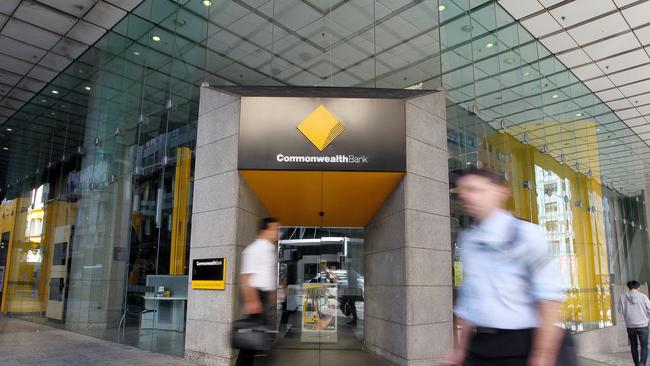US Treasury opens file on CBA Austrac breaches
US anti-money-laundering agency FinCEN has in the past two years received hundreds of pages of reports about CBA.

US anti-money-laundering agency FinCEN has in the past two years received hundreds of pages of reports about Commonwealth Bank under laws designed in part to protect against international terrorism, The Australian can reveal.
The Financial Crimes Enforcement Network, which is part of the US Department of the Treasury, has denied The Australian access to 511 pages of documents following a request under freedom of information laws for records relating to breaches and violations of anti-money-laundering and counter-terror finance rules involving CBA since the beginning of 2016.
The bank, the nation’s largest, is currently fighting allegations brought against it by local regulator Austrac that since 2012 it had breached Australian anti-money-laundering and counter-terror finance laws more than 58,800 times.
According to its website, CBA has just one US branch, servicing corporate and institutional clients, in New York.
Analysts say that if the US authorities take action against the bank over the Austrac allegations it could increase total penalties for the breaches by as much as $1 billion. This would come on top of local penalties if a court found against it.
A CBA spokesman said the bank provided reports to FinCEN that might assist in investigating financial crime.
“We are not aware of any investigation or action by FinCEN concerning Commonwealth Bank of Australia, nor have we reported any breaches of US law by Commonwealth Bank of Australia to FinCEN,” he said.
FinCEN wrote to The Australian revealing that it held CBA-related records on Monday, the same day the bank appointed Matt Comyn, who runs the retail bank targeted by Austrac’s allegations, as successor to chief executive Ian Narev.
In a letter rejecting the FOI request, FinCEN cited a section of the US Bank Secrecy Act that required Treasury to prepare reports on transactions “where they have a high degree of usefulness in criminal, tax, or regulatory investigations or proceedings, or in the conduct of intelligence or counterintelligence activities, including analysis, to protect against international terrorism”.
FinCEN said these records were “specifically exempted from disclosure … which includes disclosure of reports pertaining to monetary instruments transactions” filed under the Bank Secrecy Act.
In the letter, it also refused access because the documents contained information that would invade personal privacy.
The Australian revealed in September that a confidential internal review of CBA’s compliance with global anti-money-laundering and counter-terrorism laws revealed large-scale failures in transaction monitoring in businesses around the world.
Access to the US market is important to CBA because it relies on American investors to fund $45bn of its $129bn in long-term debt. News of FinCEN’s CBA file comes amid increasing pressure on the bank from domestic regulators including the Australian Securities & Investments Commission, which on Tuesday filed legal action against it accusing it of interest-rate rigging, and the Australian Prudential Regulation Authority, which is expected to release an update into the bank’s cultural problems today.
CBA is also likely to be a prime target of the royal commission into banks, which begins hearings in less than a fortnight, after financial planning, insurance and term deposit scandals.
In an Australian Federal Court lawsuit, Austrac accuses the bank of breaches of AML-CTF including laws failing to properly assess the risks of so-called “intelligent deposit machines” before they were rolled out in 2012, failing to report suspicious matters that were the subject of police investigations and failing to promptly report suspected terror finance activity.
The bank faces a penalty of up to $21 million for each of about 53,800 breaches alleged by the regulator — or more than $1.1 trillion — but analysts estimate any penalty to come in the range of $1bn-$2.3bn, with the upper end of the range more likely if US authorities become involved.
CBA’s spokesman said bank staff “continuously engage with all relevant regulators responsible for anti-money laundering and counter-terrorism financing obligations including FinCEN”.
“In the ordinary course of interactions with a regulator, including FinCEN, we will share information that may assist law enforcement bodies in the investigation of financial crimes,” he said.
Austrac alleges CBA accounts were used by organised crime, including a NSW money-laundering group that allegedly cleaned some $42m derived from drug and gun running.
A joint NSW Police and Australian Criminal Intelligence Commission investigation, Strike Force Bugam, targeting the gang has since 2016 seized at least 12kg of cocaine, 6kg of ice, 1000 ecstasy tablets, seven illegal guns, six vehicles and $1.7m.
The alleged ringleader of the money-laundering operation, 40-year-old Thi Lan Phuong Pham, was arrested at Sydney airport in January last year as she was waiting to board a flight to Vietnam, where her family is in the luxury hotel business.
Austrac also accuses CBA of failing to meet a 24-hour deadline to inform it about repeated attempts by a Lebanese-Australian man who in the past has been accused of being involved with al-Qa’ida to transfer money into his Beirut bank account.
The transfers were repeatedly foiled by CBA, although one tranche of $5000 made it all the way to Lebanon before the bank managed to retrieve it.
Incoming chief executive Mr Comyn has run the retail bank, which takes in CBA’s branch and ATM network, since 2012.
Announcing his appointment on Monday, CBA chairman Catherine Livingstone attempted to minimise his responsibility for the Austrac debacle, saying the bank bore “collective responsibility”.
Ms Livingstone said Mr Comyn’s “level of leadership and accountability” regarding Austrac’s allegations “give us the confidence that as CEO he understands the issues and is moving very quickly to address those issues”.




